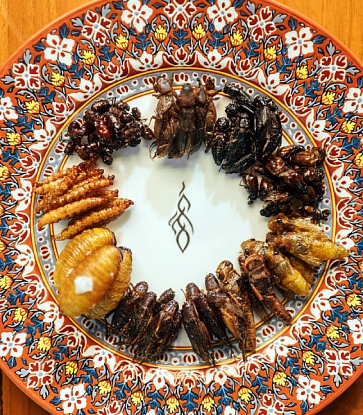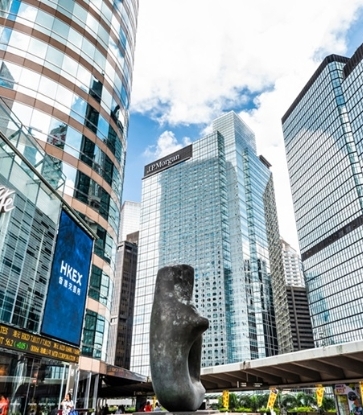The restaurant Muoki takes its name from the South African word for "oak tree," reflecting the steadfast nature of Chef-owner Moo-hyun Park himself. After spending many years abroad, chasing his culinary dreams and enduring countless hardships, Park grew to admire trees with deep, sturdy roots. Though the journey towards his aspirations was necessary, living alone in foreign lands was not always easy or joyful. For Park, large, unyielding trees, standing firm regardless of the unpredictable weather, became a source of comfort and a profound teacher in life. His admiration for the unseen, continuous growth of these trees is mirrored in the dishes served at Muoki. Just as the growth rings of a tree accumulate over time to form a strong trunk, Chef Park meticulously layers each dish with various techniques and careful preparation, turning simple ingredients into stories on the plate. Every day, these thoughtful creations grace the tables at Muoki.
Chef Moo-hyun Park humorously describes himself as a “rock-paper-scissors chef.” During his high school years, he first encountered cooking by chance, losing a game of rock-paper-scissors and ending up in a hobby cooking class. Yet, it didn’t take long for him to realize that cooking was the path he was meant to pursue. Drawn to cooking as if by destiny, Park embarked on a culinary journey that took him to Iraq, the United States, the UK, Australia, and South Africa. For over a decade, he worked at some of the world’s most prestigious restaurants. Even in the early stages of his career, when his experience was still limited, his passion left a lasting impression on top chefs. His heartfelt plea, “I’ll clean the kitchen if you’ll just let me learn here,” eventually became the foundation of his skills and experience, growing his personal “tree rings” of expertise and shaping the chef he is today.

In a fast-changing world, ‘honesty’ remains the most important guiding principle for Chef Park. “Honesty with ingredients, honesty with customers, honesty with colleagues, and, above all, acting in a way that I won’t be ashamed of myself—this kind of integrity is essential,” he says. Chef Park believes that this honesty fosters a positive team culture within the restaurant, giving his staff a sense of pride in their work. At Muoki, the kitchen is designed like a stage, fully open to customers. Chef Park takes pride in allowing guests to witness firsthand how meticulously and cleanly the team works. The pride the staff takes in their craft is reflected in the energy that reaches the guests.

Muoki’s cuisine is known for its complex, delicate layers of flavor. Chef Park explains that even the most ordinary ingredients can offer a multitude of tastes, textures, and aromas when prepared in diverse ways and combined harmoniously with others. “Just like pairing a fine wine with good food can create a more enjoyable experience, I aim to preserve the natural flavors of ingredients while seeking a perfect harmony and balance. It means more work in the kitchen, but it’s worth it for delicious food,” he says with a laugh.
This approach results in dishes that combine meats, vegetables, light and rich sauces, and a variety of tastes and textures on a single plate. Signature dishes like Muoki’s “Tomato in Seven Ways” or “Carrot in Five Ways” have become beloved staples. One dish, featuring carrot as a refreshing sorbet, a smooth mousse, a crisp tuile, and sous-vide cooked, exemplifies the exploration of an ingredient’s full potential while creating balance within its complexity.

Chef Park constantly explores new culinary techniques, fueled by his natural curiosity. When the guests leave, the kitchen becomes his playground and research lab. "Even if I cook for the rest of my life, could I experience even 10% of all the possible dishes in the world?" Despite having cooked for 24 years, he admits that developing new menus is still challenging. With boundless curiosity, he continues to experiment with how different ingredients and techniques can create unique flavors and textures. Whether these experiments succeed or fail, the entire process fuels his passion for cooking.

He reflects on his return to Korea in 2015 after a long career abroad. Though Korean by nationality, the prospect of cooking in Korea felt overwhelming at first. "For a chef, it’s unimaginable to start cooking without knowing the local ingredients. So, before I even returned, I planned a 50-day journey across Korea to learn about its ingredients." He traveled the country, visiting fig and blueberry farms, native chicken farms, salt farms, and tofu makers, learning invaluable lessons from each experience.
His journey hasn’t stopped since. "For the past five years, I've been visiting ‘Junhyuk’s Farm’ in Namyangju every week. The farm grows around 50 types of crops, primarily herbs and edible flowers. The produce changes with the seasons, but I usually harvest about 10 varieties of vegetables each time I go. Even though the trip takes a long time, I’m incredibly grateful to be able to bring the ingredients I’ve personally harvested—often with cobwebs in my hair, bug bites all over, and sweat on my brow—back to Muoki and incorporate them into the dishes.”
Special menus presented by GENESIS X Michelin Guide at Muoki

Chef Moo-hyun Park’s favorite vegetable, and one he finds particularly captivating, is the beet. For his beet dish, he softens the earthy flavors by gently cooking it in herb-infused oil and marinating it in yuzu pickles. The beets are then paired with a smoked goat cheese mousse, an apple and fennel salad, and crunchy, sugar-coated hazelnuts. The vibrant red beet is artistically shaped to resemble a blooming rose and garnished with rich caviar and a bourbon whiskey sauce, adding a touch of umami from the sea. This dish embodies Muoki's philosophy of seeking complexity.

The Muoki Egg, one of the restaurant’s signature dishes, is now in its third iteration after multiple refinements. It begins with chicken liver, cooked with onions and mushrooms for a rich, nutty flavor, topped with sautéed parsnips and chicken mousse, carefully molded into the shape of an egg. The dish is finished with a velvety parsnip velouté sauce and crisp parsnip tuile, offering a subtle sweetness. When eaten, the soft texture melts in the mouth, followed by the rich, layered flavors of sage, mushrooms, and chicken liver, creating a lingering enjoyment.

For autumn, Muoki’s Hanwoo (Korean beef) dish is served with a variety of seasonal mushrooms. The steak is complemented by grilled lion’s mane mushrooms, known for their buttery texture, and the deep flavors of neungi mushrooms. Chef Park slow-cooks the mushrooms with port wine, allowing the flavors to meld, before pureeing them into a silky sauce. Accompanying the steak is his signature Café au Lait sauce, a delicate blend of black pepper, brandy, wine, dark sugar, beef jus, and milk. This sauce has evolved over the past seven years, with more than 30 refinements since Muoki first opened. Together with the balanced richness of Hanwoo striploin, crispy potato pickles, and the evolving flavors of the sauce, this dish provides a deeply satisfying experience for the palate.

“For Muoki to be remembered deeply and firmly, we strive to give our best every day.”

Chef Moo-hyun Park likens Muoki to a "tortoise" restaurant—quiet, steady, and unwavering in its journey toward a lofty goal. He draws inspiration from the story of the tortoise and the hare: "The hare may be talented and charismatic, but it ultimately loses to the tortoise by failing to make the most of its strengths. The tortoise, though much slower and lacking in skill, possessed the powerful trait of persistence." He humbly acknowledges that, compared to other exceptionally gifted chefs, he may not have an abundance of natural talent. However, he is confident in his perseverance. "What guides me in life is a commitment to steady, consistent effort, so that I have no regrets. Muoki may not yet have the flashy allure of the hare, but with each team member working in unison, we continue to build our own layers, one step at a time. Our dream and goal are to become a great tree—one that provides strength, comfort, and shade to those who seek it."



















